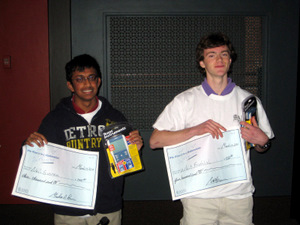
Who Wants to Be a Mathematician at the University of Michigan

"I'd like to thank you for this great experience that I'll never forget."
"The contest today in Ann Arbor was certainly fun and a great experience for Whit and everyone today from our school."
"We had a great time and it was good for the kids to see math in action from their peers. Thank you for having us."
"Thank you for the exciting competition and great opportunity."
Neil Gurram, a senior at Detroit Country Day School, won $3000 from the AMS and a TI-Nspire graphing calculator from Texas Instruments playing Who Wants to Be a Mathematician on Friday, March 19 at the University of Michigan in Ann Arbor. Neil was one of eight high school students from the Detroit-Ann Arbor area who played Who Wants to Be a Mathematician that day. The contest followed a talk on number theory by Michael Zieve of the University of Michigan's Department of Mathematics, who was introduced by the department's Director of Undergraduate Programs, Stephen DeBacker (who was the speaker the last time Who Wants to Be a Mathematician came to Ann Arbor). Below are summaries of the talk and games, including video of the games.
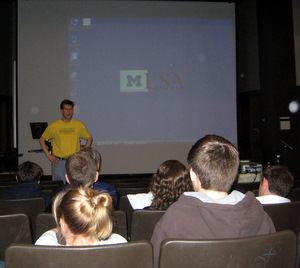 |
 At left, Stephen DeBacker. Above, Michael Zieve |
Prime Factorization, Michael Zieve, University of Michigan
When Zieve was young he thought mathematicians spent their time multiplying big numbers, so his goal in this talk was to give the audience an idea of what mathematicians do, through examples in number theory. He noted the 2009 survey that named mathematician as the best job in the U.S. Zieve agreed with the survey, but not for practical reasons. Instead, he said that mathematics is all about creating and exploring new worlds, and seeing the connections between them. So doing mathematics "is like going to outer space, except you do it in your office."
He then talked about prime numbers and the Fundamental Theorem of Arithmetic, showing Zermelo's 1934 proof. Zieve then asked if unique factorization carries over to other worlds such as the even numbers (it doesn't) or to polynomials with integer coefficients (it does). To counter the impression that there is no new mathematics, he gave a result obtained this year by his PhD student Brian Wyman about unique factorization in the collection of polynomials with integer coefficients in which the operation is composition.
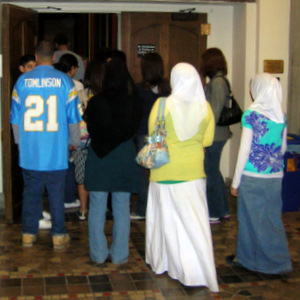 |
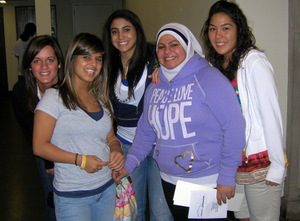 |
After some nice refreshments provided by the Department of Mathematics, the audience returned to the auditorim and watched eight students (pictured below) play two games of ...
Who Wants to Be a Mathematician
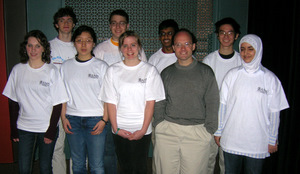 |
|
Front (left to right):
|
Back (left to right):
|
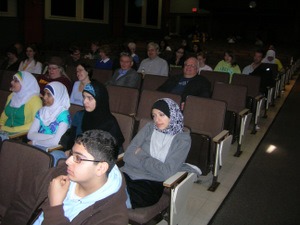 |
 |
 |
Neil Gurram won game one, answering every question correctly. Before the game, three of the game one contestants declared their altruistic plans for any cash that they might have won. Stephanie Sanders said that she would use some of her winnings to buy calculators for her school. Kevin Wang planned to give some of whatever cash he won to charity and Neil planned to give a portion of his cash winnings to the American Red Cross. (Left to right: Neil, Stephanie, Julia Sikora, and Kevin) |
 |
No one answered all the questions correctly in game two, but three of the contestants in this game each missed only one question, which made for an exciting contest. Heemyung Hwang and Mike Yonick were tied for first through question six. Mike missed question seven, which allowed Whit Froehlich to move into second place. Then Whit answered question eight correctly, but Heemyung didn't, and so Whit won game two. Four hundred points separated Whit, Mike, and Heemyung at the end of the game. (Left to right: Mariam Ayyash,Whit, Heemyung, and Mike) |
In the Square-Off Round--one question to decide who would get the chance at the Bonus Question--Whit signaled in first, but was wrong. This gave Neil 60 seconds to think about his answer. He used about 58 of those seconds and answered correctly when he signaled in, so he got a chance at the $2000 Bonus Question.
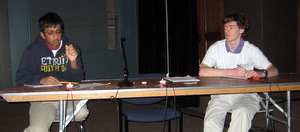 |
Neil used all his time on the Bonus Question as well, and answered correctly to win the big money. He gave a great explanation of how he arrived at the correct answer.
|
Here are all the prizes won by the contestants in Who Wants to Be a Mathematician.
- TI-Nspire graphing calculator from Texas Instruments and $3000 from the AMS: Neil Gurram
- TI-Nspire graphing calculator from Texas Instruments and $500 from the AMS: Whit Froehlich
- Maple 13 from Maplesoft: Kevin Wang and Mike Yonick
- Calculus by Anton, Bivens and Davis from John Wiley and Sons: Julia Sikora and Heemyung Hwang
- What's Happening in the Mathematical Sciences from the AMS: Stephanie Sanders and Mariam Ayyash
The AMS thanks sponsors Texas Instruments, Maplesoft, and John Wiley and Sons for their continued generous support of Who Wants to Be a Mathematician. Thanks also to local organizers Stephen DeBacker and Carrier Berger of the University of Michigan's Department of Mathematics, Norman Richert of Mathematical Reviews® for all the work they did to make the lecture and game a success, and to the students, teachers, parents, and AMS staff from Mathematical Reviews® who attended. This being the first warm Friday of spring, there were many temptations--such as beach volleyball on frat house lawns--that they passed up to attend the lecture and game.
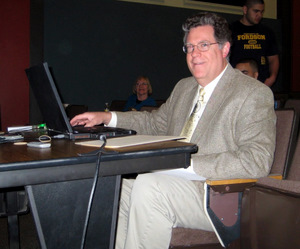 Pay no attention to the man behind the laptop (at your peril). |
Photographs by Who Wants to Be a Mathematician judge and co-creator Bill Butterworth (DePaul University Department of Mathematical Sciences), and by Norman Richert and Mike Jones (Associate Editors, Mathematical Reviews®). Text by Mike Breen.
Find out more about Who Wants to Be a Mathematician.


